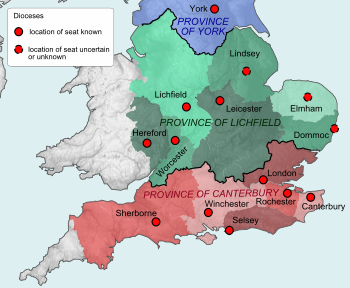Hygeberht
After Offa's death his distant relative Coenwulf became king, and petitioned the pope to have Lichfield returned to a simple bishopric.
The pope agreed to do so in 803, by which time Hygeberht was no longer even considered a bishop: he is listed as an abbot at the council that oversaw the demotion of Lichfield in 803.
[5] At the Council of Chelsea held in 787, Offa secured the creation of an archbishopric for his kingdom centred on the diocese of Lichfield (in modern Staffordshire).
[6] Offa may have justified the move by suggesting that Jænberht planned to allow the Frankish king Charlemagne to use a landing site in Kent if the latter decided to invade,[7] although this is only known from a 13th-century writer, Matthew Paris.
[8][b] Another concern was probably that of prestige, as having the main Mercian diocese held by an archbishop rather than a bishop would increase the kingdom's status.
[13] The historian Nicholas Brooks sees the coupling of the elevation of Lichfield with the consecration of Ecgfrith, who was Offa's son, as significant.
C. J. Godfrey has argued that the donation was really in return for the papal approval of Offa's scheme to elevate the diocese of Lichfield to an archdiocese.
Whatever Offa's motivation, historians have generally seen the gift as the beginning of Peter's Pence, an annual "tax" paid to Rome by the English Church.
[18] Hygeberht then was considered the senior prelate in the south of England, as shown by him being listed before Æthelhard in any charters they both appear on.
The reasons for holding joint councils are unclear; they may have been a manifestation of Offa's desire to supervise the entire southern church, or an attempt by the archbishops of Canterbury to retain some authority over the province of Lichfield.
The king's envoys laid the blame for the problems encountered with the Lichfield archdiocese on Pope Hadrian I's incompetence.
Finally, in 802, Pope Leo III granted that Hadrian's decision was invalid, after the English clergy told him it had been achieved by Offa's misrepresentation.
